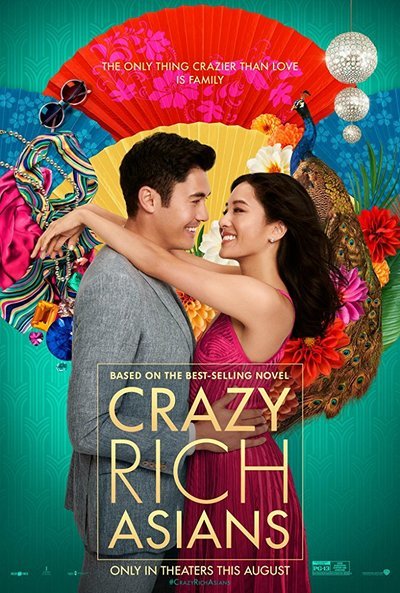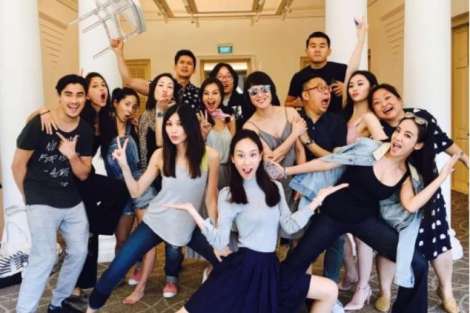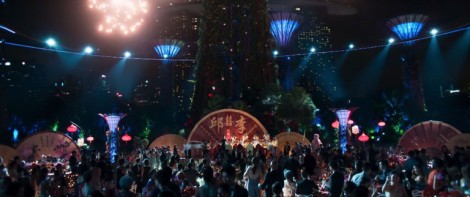Monthly Archives: August 2018
21/08/18 Crazy Rich Asians: Representation, Reflection, and Redemption

REPRESENTATION
Crazy Rich Asians was #1 in the box office this weekend and has already made and surpassed the budget it took to make the film. Why is that? Representation. Yes, there hasn’t been a rom-com out in a while (and certainly not one that has claimed the number one spot), but it’s also been nearly 25 YEARS since there’s been a major Hollywood studio backing an Asian-American front lined cast. As Awkwafina (providing great comic relief in the film as bff Peik Lin Goh) put it, there have been fully adult Asian Americans walking around with no representation in films in their lifetime until this film. And as Nico Santos (playing the cousin on the outskirts, Oliver T’sien) stated “there’s nobody doing martial arts in this movie. There’s nobody fleeing villages. You know what I mean? We just get to be really awesome people, living our lives and dealing with universal themes that everybody can really relate to.”
Representation is powerful. An Asian American Huffpost editor’s tweets went viral as she shared about her experiences in the past that made her hate her own ethnicity and what it meant for her to see herself reflected on the big screen. Beyond the anecdotes and the word of mouth, the numbers have demonstrated the effect of this representation too as Asian-Americans flocked to the theatres to watch the film this weekend.
I watched the film on Thursday night and a day hasn’t gone by since that I haven’t thought about the film or watched videos of various members of the cast like a crazy person. I underestimated how much I was hungering for representation in American stories. And not just token representation. A whole cast of ENGLISH speaking personas with a whole range of personalities and backgrounds. Where ASIAN MEN are portrayed AS SEXY (not to mention a multitude of stunningly beautiful Asian women as well). And a PROTAGONIST that was not a caricature but a normal person, that the audience identifies as the American even!

REFLECTIONS
So how about the story itself? Ok it was no Black Panther (granted a different genre, but it’s level of social commentary was on a bigger scale…i mean c’mon Ryan Coogler is the bizness) but I was pleasantly surprised by CRA in how much they were still able to touch upon and invert views about class, culture, gender, and even religion. At the end of the day though it was the match up between freakin’ Michelle Yeoh 楊紫瓊 (as the mother-in-law who could express more in a slight movement of the eyes than most could do in a paragraph) and Constance Wu (with her whimsical fierceness) that brought down the house!
Of course the film had its shortcomings. To say the male love interest is a tad too perfect would be a “comfortable” understatement. One can only go so far in depth with a romantic comedy (as opposed to a romantic tragedy ;). The starting point of what was set up as as wealthy and working class (sorry, an Economics Professor at NYU is not a working class position) was a little problematic to say the least. And that the only portrayal of South Asians (as opposed to East Asians who were the main cast) were as creepy guards was saddening. I appreciate Constance Wu’s perspective though when she expressed “I know CRA won’t represent every Asian American. So for those who don’t feel seen, I hope there is a story you find soon that does represent you. I am rooting for you. We are not all the same but we all have a story.”
With that said, i think there was also some great conscious commentary. Of course there’s the culture clash of American individualism and the more Asian collectivism, the marginal man experience of a person as part of two cultures. But that’s more familiar territory in Asian-American stories. There are fresher elements in this story for me. (LIGHT SPOILERS AHEAD) There was the the opening scene, which hauntingly is the most prophetic in my opinion of Asian Americans, where Eleanor Young, the exacting mother-in-law with pain of her own, encounters racism in a London hotel and the tables are turned when she is revealed to be the new owner of the hotel. Although it is satisfying revenge, there is also the foreshadowing of what happens when the oppressed becomes the oppressor (not just in the film but what we must consider in real life as Asians are becoming more of a dominant global force). Then there was that strangely off putting scene of Eleanor, having a bible study with her wealthy friends. Without being too overt it captured some of the religious hypocrisy of cultural (colonial even?) Christianity in an Asian circle (that’s some level 102 stereotypes game): wealth for one’s own, lack of generosity, judging, gossiping, and keeping up of appearances (shout out to my new friends at Fellowship Monrovia for that insight). There’s also the parallel storyline of the female character Astrid, the confidant cousin, and what her story tells us about the landmine of wielding feminine power. Her final words to her husband about social status and true manhood shook me. The scene that got me the most viscerally though, in terms of social commentary, was the wedding reception. It was so amazing in its opulence that it drew me in and I felt this pride welling up in me with the scope and richness (pun intended) of the Asian culture. (SPOILER ALERT) Then in a totally unexpected turn when the mother-in-law and grandmother-in-law shames our protagonist by bringing up an unknown past to her, the whole scene is flipped on its head, revealing the ugly and self-indulgent interior beneath the beautiful but ultimately shallow exterior of wealthy class trappings.

REDEMPTION
The most powerful redemptive analogy of the film comes in the ending act (HIGH SPOILER ALERT) in the mahjong parlor scene (which apparently was the most intense to shoot for the actors).
On one level the story comes full circle because this is where our main character, Rachel Chu, actually employs some Game Theory that was referenced in her economics lecture that introduced her near the beginning of the movie. Using the mahjong game as metaphor, Rachel demonstrates Nash’s Equilibrium, that if you play to meet only your interests you will lose but if you play considering the needs of others, you can win. So by Rachel giving up her love for the sake of the Young family to come out on top, the Young family win was only possible by Rachel losing…in which case Rachel is to credit.
On a cultural level this scene brings to bear so many elements from the culturally specific game of mahjong to the tension of filial piety and sacrifice. But most of all it highlight the American tendency to individualism vs. the Asian tendency to collectivism. If you are only thinking of individual happiness then life can become a zero-sum game where one person’s gain must always mean a loss for another. If one takes into mind the needs of a group then one person’s loss can mean a net gain.
On a spiritual level this scene echoes the work of another‘s sacrifice on our behalf. Jesus made the ultimate representational sacrifice for our sake. By Him laying down his life on the cross for our sins we could reap the benefits of His righteousness and be reconciled to God. By His loss, we win (and so He wins too – demonstrated by His resurrection). THIS was the greatest act of love.
Tags: adaptations, asian, asian american males, asian americans, class, crazy rich asians, redemptive analogies, representation
- Leave a comment
- Posted under read, see